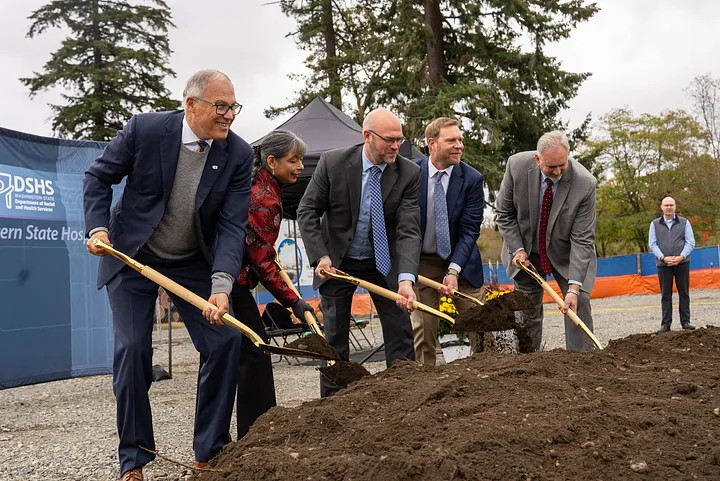LAKEWOOD—Washington Governor Jay Inslee, joined by several state leaders, broke ground on the new Forensic Center of Excellence of the Western State Hospital campus on Thursday, October 17, which will provide 350 beds when it opens in 2029.

“Today is a groundbreaking for this facility, but in a sense it’s a groundbreaking for how we provide mental health services,” said Inslee. “It is part and parcel of our efforts to care for our family members, our community members, who run into mental health challenges — this is a very Washingtonian thing to do.”
Forensic patients are those accused of a crime ordered by a court to receive treatment before trial.
Western State Hospital is one of Washington’s oldest psychiatric hospitals originally built in 1871, nearly 20 years before Washington was a state. The original building was demolished in 1886 and replaced with the structure that exists today a year later.
At that time the hospital—then called the Insane Asylum of Washington Territory—treated its patients as many behavioral health clinics did, with stigma and scrutiny. Some were even forced to work in manual labor, tending to the surrounding farmlands the hospital used to keep afloat.
During the 1940’s and 1950’s the hospital began experimenting with harsh treatments including hydrotherapy, electroshock therapy, inoculating insulin to the point of coma, and brutal lobotomies.
By 1953 more than 3,000 patients were buried anonymously at the Western State Hospital memorial cemetery.

When the current Western State Hospital building completed construction in 1887 it was taken over by the State of Washington following a series of complaints related to patient neglect, abuse, and poor living conditions.
The hospital continued to have its share of controversies in years following, however, related to chronic understaffing, multiple patients escaping, a staff member discovering a closet full of human remains packaged in tobacco cans, several sexual harassment lawsuits, worker discrimination, and historically long admission times.
In 2016 Governor Inslee fired the hospital’s Chief Executive Officer Ron Adler. Since then, the Governor insists the hospital is on the right track, using evidence-based methods by expert psychiatric professionals.
“Patient rights are at the forefront here. Historically, they might not have been thought of as important to the treatment process. But it’s our job now to make sure patient voices are heard and acknowledged,” said Emily Dodsworth, the hospital’s civil center patient rights investigator.
Two years later Inslee announced an ambitious five-year plan to revamp the hospital to create more community-based care settings that could treat civil patients, and to limit institutionalization at the state’s two psychiatric hospitals for forensic patients. That plan came full circle Thursday.
“Governor Inslee has a compassionate and grounded vision of how treating mental illness can be done right,” said then-CEO of Western State Hospital Cheryl Strange. “We must remember that mental illness is treatable. Ensuring that people get the right care at the right time and, most importantly, in the right place — where they are supported by loved ones, friends and their community — is the right thing to do.”
The implementation of that plan began with the 2018 passing of Substitute Senate Bill 5444, which authorized the creation of the Forensic Navigator Program and Outpatient Competency Restoration Program.
Leading up to Inslee’s 2018 announcement court orders for competency restoration had leapt 60% and would continue to increase an additional 60% by 2022.
A 2015 decision, Trueblood v. DSHS, challenged unconstitutional delays in competency evaluation and restoration services for people detained in jails while mounting pressure on the state to address its growing number of patients with greater urgency.
Washington State was in the midst of a mental health crisis at the time of the lawsuit with demands for mental health services, including competency evaluation and restoration services, outweighing available resources.
In response the Washington Department of Social and Health Services made growing capacity a priority to offer those suffering from mental health issues awaiting competency evaluations restoration services in a timely manner.
According to the Department of Social and Health Services, over the past seven fiscal years, inpatient evaluations and competency restoration services have increased 87%. Further, there was a 25% increase in inpatient referrals over a single fiscal year, from 2015 to 2016, and another 33% increase from fiscal year 2016 to 2017.
Since the 2015 court decision, Washington has invested over $2 billion in expanding inpatient bed capacity for forensic competency restoration services and enhancing competency programs.
Just some of these investments include a comprehensive 9-8-8 lifeline, mobile crises response teams operating in dozens of Washington counties, a newly opened teaching hospital at the University of Washington, new wards opening at Western State and elsewhere, diversion programs, and supporting housing and emergency shelters to help bring homeless individuals to treatment.
Also, with those investments comes the reimagined Western State Hospital in addition to a 100-bed hospital in Tukwila which was acquired by the state in 2023.
Western State Hospital’s new facility will reflect a modern patient-centric approach, the Governor said, by replacing bricks and bars with “glass and daylight.” This nature-inspired design is meant to reinforce the hospital’s therapeutic environment similar to the recently opened Civil Center for Behavioral Health at Maple Lane.
Author: Kienan Briscoe












